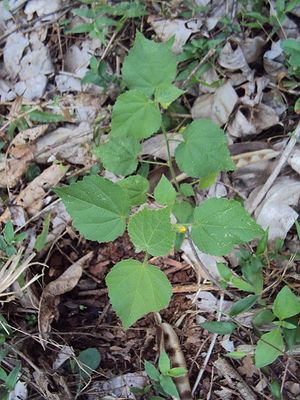Note: This is a project under development. The articles on this wiki are just being initiated and broadly incomplete. You can Help creating new pages.
Difference between revisions of "Sida cordifolia - Bala"
Chaithrika (talk | contribs) |
|||
| Line 6: | Line 6: | ||
Sida cordifolia is used in Ayurvedic medicine (Sanskrit:-BALA). Known as "malva blanca", it is a plant used in Brazilian folk medicine for the treatment of inflammation of the oral mucosa, blenorrhea, asthmatic bronchitis and nasal congestion.<ref name="uses"/> | Sida cordifolia is used in Ayurvedic medicine (Sanskrit:-BALA). Known as "malva blanca", it is a plant used in Brazilian folk medicine for the treatment of inflammation of the oral mucosa, blenorrhea, asthmatic bronchitis and nasal congestion.<ref name="uses"/> | ||
| + | |||
| + | ==Common name== | ||
| + | |||
| + | * '''English''' - Country mallow | ||
| + | * '''Kannada''' - ಬಿಳಿ ಕದಿರು | ||
| + | * '''Hindi''' - Bariar | ||
== References == | == References == | ||
Revision as of 10:20, 24 February 2017
Bala or Sida cordifolia ('ilima, flannel weed, bala, country mallow or heart-leaf sida) is a perennial subshrub of the mallow family Malvaceae native to India.
Sida cordifolia or Bala is a plant. The seeds and root are used to make medicine. Sida cordifolia contains ephedrine, which is an amphetamine-like stimulant that can cause harmful side effects. ... Some people use Sida cordifolia as a stimulant, painkiller, and tonic; and to increase urine production and raise sexual arousal.
Sida cordifolia is used in Ayurvedic medicine (Sanskrit:-BALA). Known as "malva blanca", it is a plant used in Brazilian folk medicine for the treatment of inflammation of the oral mucosa, blenorrhea, asthmatic bronchitis and nasal congestion.[1]
Common name
- English - Country mallow
- Kannada - ಬಿಳಿ ಕದಿರು
- Hindi - Bariar
